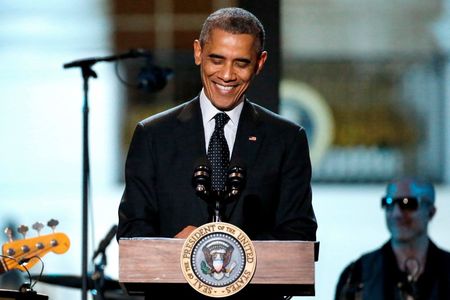By Richard Cowan
WASHINGTON (Reuters) - Republican victors of Tuesday's U.S. congressional elections break bread with Democratic President Barack Obama on Friday as the two sides assess what legislation can be enacted in coming months despite years of confrontation.
In the run-up to the lunch meeting at the White House, it was clear that in this post-election era, Obama and Republicans controlling the Congress next year would continue going at each other, just as they did before the Nov. 4 vote.
House of Representatives Speaker John Boehner and Senator Mitch McConnell, who is set to become Senate majority leader in January, said they intend to send Obama legislation repealing all or parts of the president's landmark healthcare law.
Obama countered that he will ignore Republican warnings and use his executive powers to ease some restrictions on undocumented residents, since House Republicans have steadfastly refused to advance immigration legislation.
"Finding common ground is going to be hard work. But it will be even harder if the president isn't willing to work with us," Boehner warned at a press conference on Thursday.
The White House took a more optimistic tone ahead of the meeting, saying Obama was committed to working with Republicans on issues of shared interest like infrastructure, tax reform and international trade even as differences remain on health care and immigration.
Friday's meeting is expected to focus on some major bills that must be passed promptly, once Congress begins its post-election "lame duck" session on Wednesday.
It will be the "old" Congress, the one that ends its legislative session in mid-December and has a Democratic Senate pitted against a Republican House, that must produce these bills.
At the top of the list is a $1 trillion spending bill to keep the government running beyond Dec. 11, when current funding runs out.
Other bills likely to see action in the month-long session include one to extend some temporary tax provisions, a bill renewing Pentagon programs and an expiring terrorism risk insurance bill that is important to developers of major construction projects in big cities.
The Republican and Democratic leaders of the Senate and House will also receive a briefing from military commanders on whether there has been progress in the difficult air campaign the United States and allies are waging against the Islamic State in Syria and Iraq.
Congress in coming weeks is expected to begin debating whether to formally authorise military force against the Islamic State, but a vote might not come until next year.
Meanwhile, Congress is expected this year to debate Obama's plans for arming and training Syrian rebels. A current authorization for these activities expires on Dec. 11.
Democratic leaders are likely to use Friday's session with Obama to try to raise other issues, such as increasing the federal minimum wage for hourly workers and providing equal pay for women.

"Instead of voting on GOP (Republican) bills to protect millionaires and big corporations and repeal health coverage and patient protections for millions of Americans, Americans want us to come together and immediately address these priorities," said Drew Hammill, a spokesman for House Democratic leader Nancy Pelosi.
(Additional reporting by Roberta Rampton, David Lawder and Patricia Zengerle; Editing by Dan Grebler)
